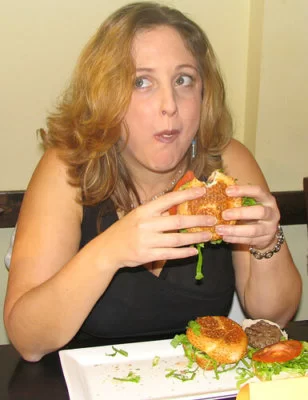Why Can’t I Just Eat Healthy? The Psychology of Food Choices

By: shira gal
by Andrea M. Darcy
Wellbeing is the buzz word in psychology lately, with the connection between physical and mental health increasingly made. Healthy eating is an obvious part of the self-care equation, and most of us know what that involves.
So why do so many of us struggle to make healthy food choices despite knowing how to eat well?
Are you using food to punish yourself?
Poor food choices despite knowing better can relate to a common modern problem – low self-worth.
Low self-worth means that on a certain level, you feel you deserve to suffer. And food is an easy way to enact this unconscious belief.
If you eat foods that leave you feeling bloated, unhealthy, or low energy, or foods that cause you gastrointestinal discomfort, then you suffer.
Putting on extra weight can also be part of the food and the low self-esteem cycle. If your lack of self-worth comes with a belief you aren’t worthy of positive attention or love, eating to the point you are always overweight gives you a reason to beat yourself up and convince yourself nobody will want you. It’s like you are trying to hide behind your own body.
Questions to ask yourself if this feels like you:
- Do I really want this food I am about to eat? Or is this about something else entirely?
- Am I eating because I am hungry, or because I am feeling low?
- What is one tiny thing I could do right now to feel good about myself instead of eating food I don’t need (dancing around to my favourite song, going for a walk in nature, calling a friend)?
- What things are right about me? Can I make a list and post it where I’ll see it daily?
- What scares me about eating healthy and taking better care of myself?
- What would I have to give up by eating healthy (feeling bad about myself, being able to get attention over my food issues, friends who also have food issues, etc)?
Is food your reward system?
Alternately, many of us use food as a sort of ‘reward’ system without even realising it.
Do you tend to eat ‘special’ foods when you are celebrating? When you have accomplished your main task for the day do you reach for a cookie? Buy an entire cheesecake on the way home from a work presentation that went well? Tell yourself you can eat dessert because you managed not to bite your nails all day?
These are all ways of making food part of a points system, something which often stems from a childhood of being given ‘treats’ if you were ‘good’.
Ask yourself these questions:
- Am I eating because I am fuelling my body, or because I am wanting to reward myself?
- Did I learn as a child that food was a way to reward myself?
- Did my mother or father buy me food as a gift instead of things like books or toys?
- What is a nicer way to reward myself instead? Can I make a list of small things I can do for myself?

By: Austin White
Food and love
If you were the sort of child who was given candy or treats instead of support and praise when you were ‘good’, or had a parent who didn’t tell you they loved you but often cooked you lavish meals, you might have a hidden core belief that food is love.
While roles have changed in recent years, many of us grew up with stay-at-home mothers who might have seen cooking for us as one of their only avenues to show their love.
Or, for some of us, it’s just that all our good memories, like family gatherings, rotate around meals, or that in our culture food is connected to emotion.
Perhaps we now carry on this trait, making three course meals for our loved ones and then basing some of our self-esteem on our food being appreciated, secretly sulking if it isn’t.
It’s admittedly romantic to connect food and love. Many movies, such as Chocolat and Big Night give us the idea that food is a way to gain love, have a great time, feel part of something, and even change the world.
Then there is the theme much touted by such movies and books that those who eat a lot are in touch with their own desires, and those who don’t, aren’t (this is not actually true).
Of course in the movies we don’t see people with weight issues that leave them reclusive, the anorexics who connect food and love but feel they don’t deserve love so rather starve, or those suffering depression because they are failing to take care of themselves.
Questions to ask here are:
- Did I grow up in a home environment where love was shown with food instead of other actions or through verbal support?
- In what ways might I have confused love and food?
- Do I cook as a way of showing love? Is my esteem connected to my cooking?
- Do I see making rich meals for myself as a way of taking care of or loving myself?
- What other ways, outside of food, can I think of to give and receive more love?
- Can I accept that it’s perfectly natural to want love? And allow myself to want that, while also realising that food isn’t the love I need?
Food as distraction
The most common reason so many of us struggle to eat healthy is very much a psychological one – we want to avoid having to process emotions we are uncomfortable with and use food as the effective distraction and drug it so easily can be.
Many people reach for sugar when they are feeling sad, or a fatty carb overload to numb things out when they are feeling angry.
And it’s not just sadness or anger that you might be using food to avoid – it’s actually common to use food to suppress any excess of any emotion, including really good ones like joy and elation.
If you struggle from low self-esteem, and something good happens like a promotion out of the blue or something you wrote being published, you might actually feel quite panicky. After all, reality is daring to deviate from your personal belief system that you don’t deserve success. Turning to junk food or a binge can be a socially acceptable way to avoid feeling too emotional.
If this feels all too familiar, try asking yourself the following questions:
- How often do I actually let myself feel sad, angry, or really really good? Do I often instead just feel okay?
- Was I told as a child to not to cry, punished if I felt angry? Was I given food to distract me if I was upset?
- Do I snack often instead of proper meals? Are those snacks something I reach for when hungry, or when emotional?
- Did I at some point learn that feeling too happy is dangerous or arrogant?
- What is the worst thing that could happen if I decided to let myself feel happy/angry/sad?
What are the signs that you are an emotional eater?

By: Hans Dinkelberg
Not sure if your eating patterns are connected to the various forms of emotional eating covered above?
These are the signs of emotional eating to watch for:
- Sudden changes in your eating patterns that match stressful life changes (healthy for two weeks, binge for three days when your boss reprimands you)
- Secretive eating (which emotional eating often is)
- Not telling truth to others about what your really eat
- Mindless eating, where you look down to notice you’ve eaten an entire package of something without really tasting it
- Always hungry after any sort of fight or conflict
- Raid the fridge after a hard day or alternately really successful at work
- Gain weight after relationship breakups or other hardships
So how are you supposed to approach food?
So where is the healthy viewpoint in all of this? How can you change your psychology of food? It lies in remembering what food really is. It’s not something we have to ‘deserve’, or are ‘bad’ for wanting. It’s not something criminal we have to spend our entire lives at war with. It isn’t, despite the culture that has sprung up around it, a status symbol.
It’s simply fuel for the body.
Food really has no other useful purpose other than as something that converts into calories and allows us to carry out our daily routines. All over views are things we have simply bestowed onto food, often making a distraction or demon of a necessary habit instead of facing our own demons.
If you are curious how your emotions are affecting your eating choices, try keeping a diary where you record not just what you are eating, but how you are feeling at the time you eat and what events are going on.
You might start to see obvious patterns – for example, that you hit the treats cupboard when you are stressed or feel slighted, and load up on heavy fatty foods when things are going really well, using food to feel grounded instead of letting yourself feel good.
Of course if you have longstanding issues with eating that relate to childhood patterns, core beliefs, or low self-esteem, then a pep talk on how to approach food isn’t that helpful. You might need professional support and the time to understand yourself and your patterns clearly.
If you feel your eating habits are truly out of control, if you are overeating more often than not, or are worried you might even have an eating disorder, it can be a good idea to seek such help. You might want to see an eating disorder counsellor, or a cognitive behavioural therapist (CBT) who can help you understand and take control of the link between your thoughts, feelings, and actions. A general psychotherapist or counsellor can also help you recognise your own patterns around eating, how they came into being, and what you can do to make better choices for yourself moving forward.
Do you have advice for others on how to overcome emotional eating and make healthy food choices? Share below, we love hearing from you.
 Andrea M. Darcy is a writer and mentor, who knows the ins and outs of emotional eating! Find her @am_darcy
Andrea M. Darcy is a writer and mentor, who knows the ins and outs of emotional eating! Find her @am_darcy





If I would have read this in 1985 it would have saved my decade long struggle with emotional binge eating. THANK YOU
Glad you found it helpful.
Wow! Such a thoughtful, well-written article. I’m a licensed psychotherapist and will be adding this to the must-read list for clients who struggle with emotional eating. Thanks so much. 🙏
Glad you found it useful!
Thank you so much for this.
Sigh. Yet again another article pointing out everything I already know with the only answer being to see professional help … I’m seeing a councillor and still feeling frustrated that I’m not making any progress despite talking extensively about my childhood trauma. Will/Can I ever change; who knows I certainly don’t.